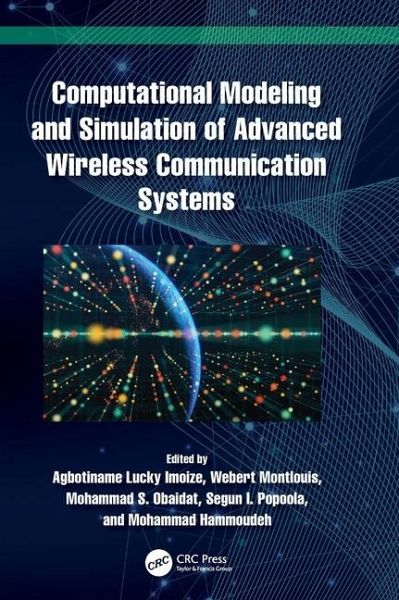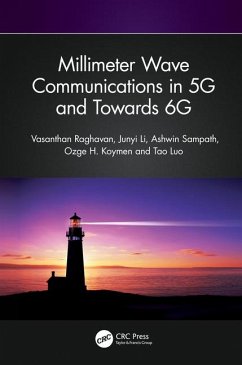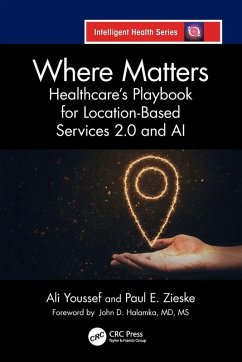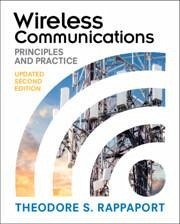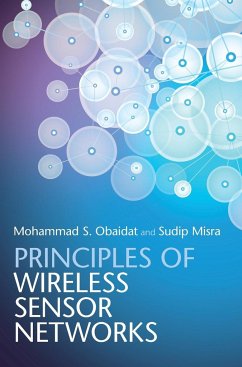Gebundenes Buch
Computational Modeling and Simulation of Advanced Wireless Communication Systems
Versandkostenfrei!
Versandfertig in 1-2 Wochen
Weitere Ausgaben:

PAYBACK Punkte
110 °P sammeln!




The book covers the exploitation of computational models for effectively developing and managing large-scale wireless communication systems. The goal is to create and establish computational models for seamless human interaction and efficient decision-making in beyond 5G wireless systems.
Agbotiname Lucky Imoize is a Lecturer in the Department of Electrical and Electronics Engineering at the University of Lagos, Nigeria. His research interests cover the fields of 6G wireless communication, wireless security systems, and artificial intelligence. He is a Fulbright research fellow, the vice chair of the IEEE Communication Society, Nigeria chapter, and a registered engineer with the Council for the Regulation of Engineering in Nigeria. He is a senior member of the IEEE. Webert Montlouis (FIEEE) received his BS, MS, and PhD in electrical and computer engineering from Northeastern University, Boston, MA, USA. He is currently at Johns Hopkins University, Baltimore, MD. He has served as Chief Scientist at the Applied Physics Laboratory and faculty in the Electrical and Computer Engineering department. He has been the chair of the IEEE Massive MIMO standard development working group and the co-chair of the Massive MIMO working group. He has served as general co-chair of the IEEE Massive MIMO workshop and session chair for many IEEE conferences. His research interests include Multi-Channel System Architecture, Sensing, Next Generation Radar Systems, Wireless Communications 5G and Beyond, Artificial Intelligence, Quantum Information Science, Digital Signal Processing, and Biomedical Signal Processing. He is a Fellow of the IEEE and a member of the IEEE Signal Processing Society, the IEEE Communications Society, and the IEEE Aerospace and Electronic Systems Society. Mohammad S. Obaidat (Life Fellow of IEEE, Fellow of AAIA, and Fellow of SCS) is recognized globally for his pioneering and lasting contributions to several areas, including computing, communications, AI, cybersecurity, modeling and simulation, and IT. He is a Distinguished Professor at the King Abdullah II School of Information Technology (KASIT), University of Jordan, Distinguished Professor at the University of Science and Technology Beijing, SRM University, India, and The Amity University, India. He has published to date over 1,200 refereed journal and conference papers, 110 books and 70 book chapters. He is the founder of 5 international conferences and Editor-in Chief of 3 scholarly journals. He is the founding Editor-in-Chief of the Wiley Security and Privacy Journal and editor or advisory editor of several scholarly journals. He has chaired over 185 international conferences and has given, to date, 185 distinguished keynote speeches all over the world. Segun I. Popoola is a senior Lecturer in the school of computing and information science at Anglia Ruskin University, United Kingdom. He received the Ph.D. degree in cyber security and artificial intelligence from the Department of Engineering, Faculty of Science and Engineering, Manchester Metropolitan University, Manchester, U.K in 2022. In June 2022, he was endorsed as a Global Exceptional Talent by The Royal Society. His research interests include wireless communications, deep learning, federated learning, cyber security, Internet of Things, and smart critical infrastructure. Mohammad Hammoudeh received the B.Sc. degree in computer communications from Arts Sciences and Technology University, in 2004, the M.Sc. degree in advanced distributed systems from the University of Leicester, in 2006, and the Ph.D. degree in computer science from the University of Wolverhampton, in 2008. He is the Saudi Aramco Chair Professor of cyber security with the King Fahd University of Petroleum and Minerals. His research interests include the applications of zero trust security to internet-connected critical national infrastructures, blockchains, and other complex highly decentralized systems.
Produktdetails
- Verlag: Taylor & Francis Ltd
- Seitenzahl: 468
- Erscheinungstermin: 20. August 2024
- Englisch
- Abmessung: 260mm x 183mm x 30mm
- Gewicht: 1076g
- ISBN-13: 9781032597997
- ISBN-10: 1032597992
- Artikelnr.: 70147739
Herstellerkennzeichnung
Libri GmbH
Europaallee 1
36244 Bad Hersfeld
gpsr@libri.de
Für dieses Produkt wurde noch keine Bewertung abgegeben. Wir würden uns sehr freuen, wenn du die erste Bewertung schreibst!
Eine Bewertung schreiben
Eine Bewertung schreiben
Andere Kunden interessierten sich für




